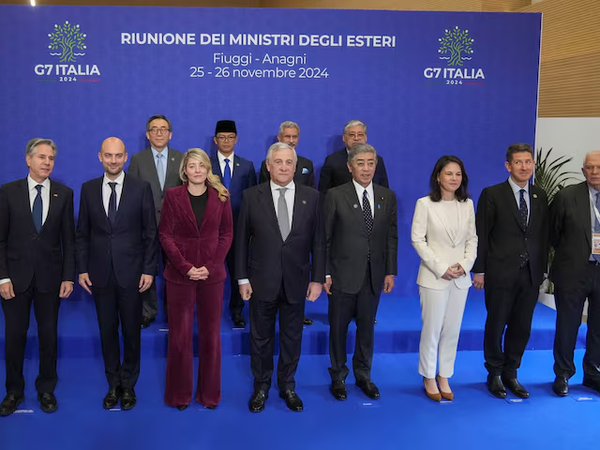The G7 and the European Union issued a formal rebuke of Iran in a joint statement on Tuesday, condemning its military actions in the Middle East, nuclear escalation, and arms transfers to Russia and the Houthis in Yemen.
The statement also reflected the international community’s growing concerns over Tehran’s regional and global activities.
“We reiterate our strong condemnation of Iran’s missile attacks against Israel, which pose a serious threat to regional stability,” the statement read.
The ministers also highlighted Iran’s support for armed groups such as Hamas, Hezbollah, and the Houthis, urging restraint to prevent further escalation.
“A wider conflict in the region is in nobody’s interest.”
The G7, or Group of Seven, is an informal bloc of seven advanced economies that collaborate on global economic and political issues. Its members include the United States, Canada, the United Kingdom, France, Germany, Italy, and Japan. The European Union also participates in G7 discussions as a non-enumerated member. Founded in 1975 as the G6 (with Canada joining in 1976 to form the G7), the group was established to address major economic challenges of the time, such as the oil crisis and global recession.
The statement comes against the backdrop of a turbulent year in Iranian-Israeli relations. In April, Iran launched Operation True Promise, a coordinated strike involving missiles and loitering munitions targeting Israel. Tehran described the operation as retaliation for an Israeli airstrike on its embassy in Damascus, which killed two Iranian generals. Israel countered with airstrikes targeting Iranian facilities, escalating tensions further.
Hostilities reached a new peak in October when Iran fired 200 ballistic missiles at Israel. Israeli forces responded with attacks on Iranian military installations, including elements of its nuclear program. Israeli Prime Minister Benjamin Netanyahu later confirmed the strikes, signaling the intensifying cycle of retaliatory violence.
Mounting nuclear concerns
The G7 also addressed Iran’s nuclear activities, underscoring their opposition to Tehran developing or acquiring nuclear weapons.
“We reiterate our determination that Iran must never develop or acquire a nuclear weapon. We will continue to work together, and with other international partners, to address Iran’s nuclear escalation.”
“A diplomatic solution remains the best way to resolve this issue,” the statement said, emphasizing Iran’s obligations under United Nations Security Council Resolution 2231.
Recent developments, however, have heightened concerns. On November 21, the International Atomic Energy Agency (IAEA) passed a resolution urging Iran to cooperate fully with inspectors. Iran responded defiantly, activating advanced centrifuges and enriching uranium closer to weapons-grade levels. By late October, the IAEA reported that Iran’s uranium stockpile had risen to 182.3 kilograms of 60% enriched uranium, a significant step toward nuclear capability.
Weapons transfers and regional stability
The statement further condemned Iran’s provision of advanced weaponry to Russia, which has been used in the Ukraine conflict.
“Iran must immediately cease all support to Russia’s aggression against Ukraine and halt such transfers of ballistic missiles, UAVs and related technology,” the G7 ministers said.
They also decried Iran’s arming of the Houthis, noting that such transfers have enabled attacks on commercial shipping in the Red Sea and Gulf of Aden.
“These maritime attacks constitute an egregious violation of international law. They have killed innocent seafarers, continue to endanger the lives and safety of crews and have exposed ecosystems in the area and coastal States to serious and grave environmental risks,” read the statement.
The G7 applauded international naval operations, including EU and US-led missions, for mitigating risks in the region.
The G7 also urged Iran to end human rights violations and cease arbitrary detentions, particularly of dual and foreign nationals.
“We reiterate our deep concern over Iran’s human rights violations, especially against women, girls and minority groups. We call on Iran’s leadership to end all unjust and arbitrary detentions, including of dual and foreign citizens, and condemn the unacceptable harassment of its citizens. We call on Iran to allow access to the country to relevant Human Rights Council Special Procedures mandate holders.”
As diplomatic efforts to address Iran’s nuclear ambitions and regional interventions continue, the G7’s unified stance signals heightened pressure on Tehran.
